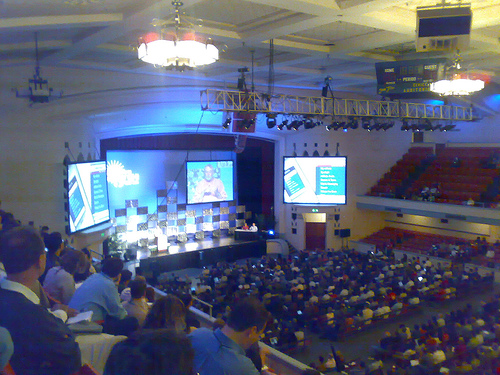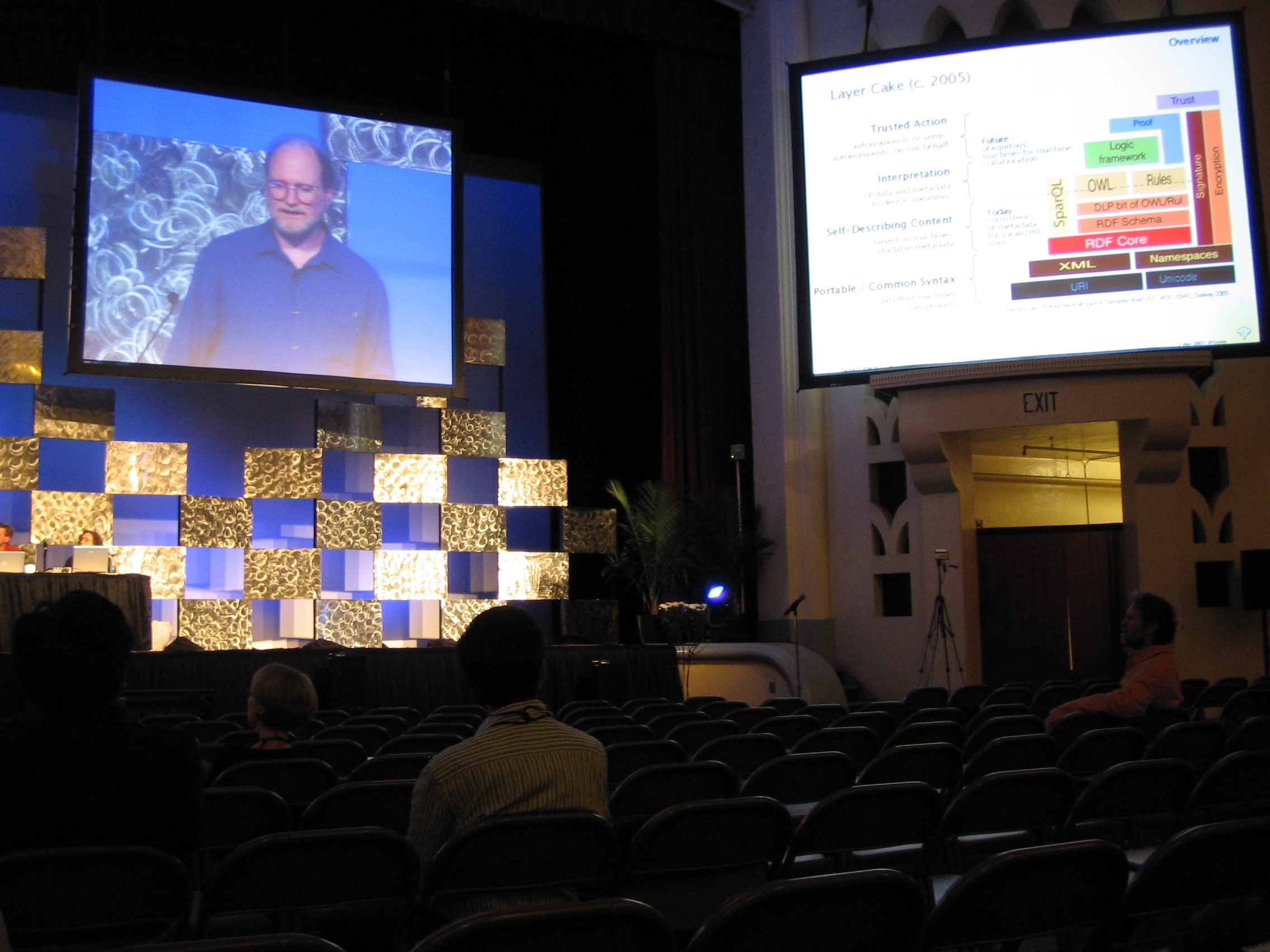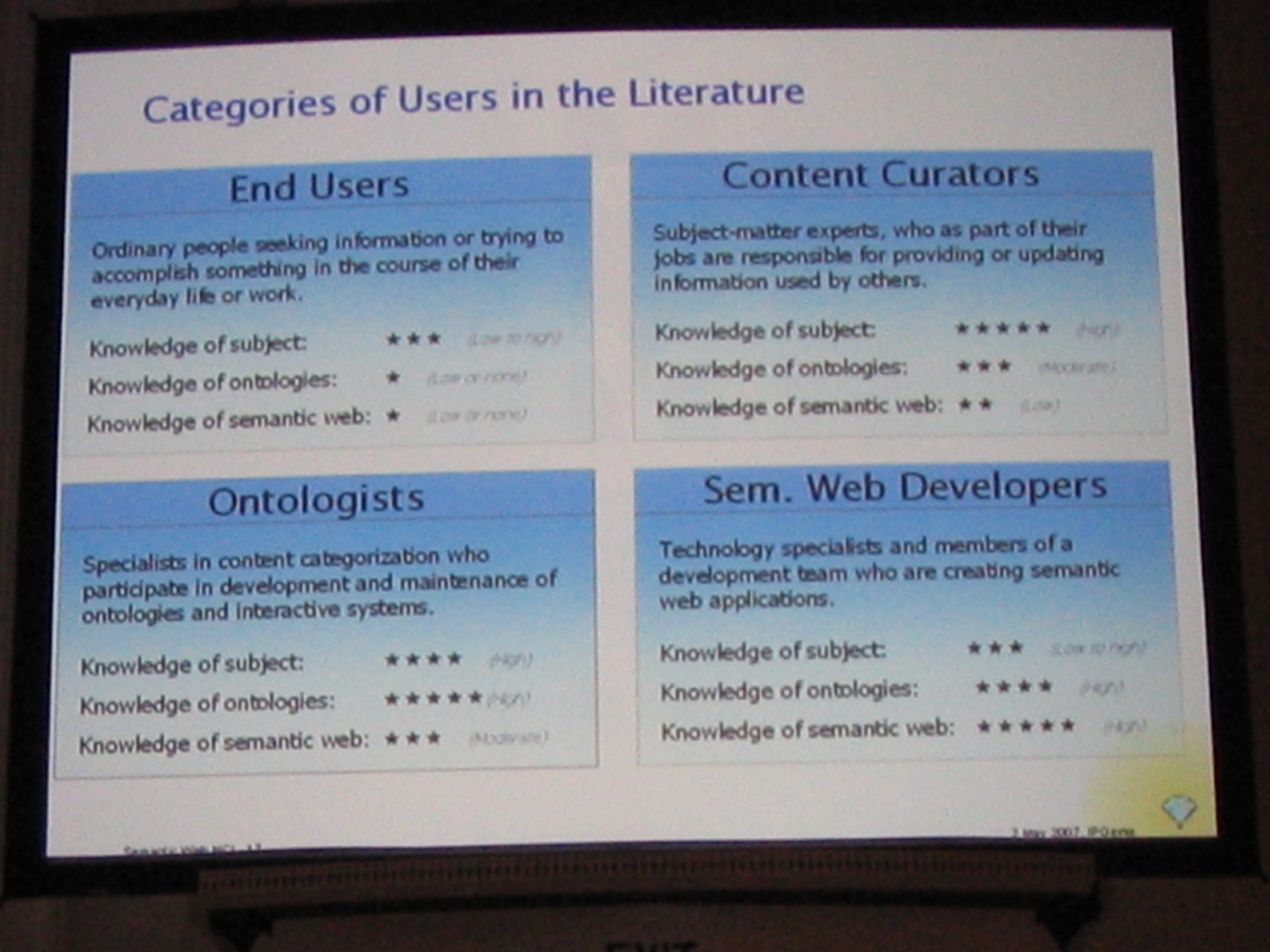CHI 2007, 27 April - 4 May, San Jose,
California
Author: Alia
Attendees: Alia, Dick Bulteman, Pablo Cesar, Henriette Cramer
Participants: +2600 people from 42 countries.
If you would like to find the papers it is stored
here.
This Year's Conference in General
Looking into the program, I do feel there is not many innovations beyond the non-desktop
paradigm. The main theme is still the same as last
year such as, mobile devices, online representation, navigation, eye gaze, and
usability. I wonder if CHI is experiencing some kind of innovation stagnation.
This year's conference talks more about reflection of what the community has
reached since the conference first started in 1983. Ben Sneiderman delivered a
speech on what
the CHI community should be doing more: e.g. HCI for biomedical, politics and voting.
On the positive side, after 25 years of existence, this year CHI pays more
attention to try to
make a real difference by bringing technology to help communities in underdeveloped
countries. The Social Impact Award is given to
Gary Marsdenn from University of
Cape Town. Gary's research interest is on using mobile technology to help
people in South Africa.
I spend my time going to courses to brush up on experiment methods techniques,
talk to people to see if they or other people which they
know are trying to do the same thing which I am doing, and get inspiration from
paper sessions.

The Social Award: Gary Marsden (University of Cape Town), for his work
bringing HCI to Africa. Originally from Ireland, did his PhD in UK, moved to
Africa in 1998. He tells a story about the cultural and social difference
that made us realize that HCI plays an even more important role when trying
to help bring technology to Africa. His emphasize Community-Computer
Interaction rather then Human Computer Interaction.
In Africa, only 10% people use landline, 10% people have access to Internet,
but 77% have mobile phones. So a lot of his research is directed towards
finding solutions for the African community using the mobile phone. Some
projects: Cell-life. One of his controversial comments: Usability is
irrelevant. The reason is, the community desperately needs solution for many
of their problems that they are willing to spend many hours learning if the
technology helps them solving their problems.
His story of bringing HCI awareness and focus his research towards helping
the community despite of all the hardship and obstacles in Africa
moved the audience. They gave him a very long
applaud. (Research that helps make the world a little bit better is inspiring
and definitly worth doing... :-) )
Jim Foley talks about the early days when he started HCI research and the
history of HCI community. HCI had many names: the man-computer dialogue, the
psychology of computing, etc.
His message is the future of HCI should be more pervasive to other fields.
HCI should now and the future be: human-centered computing concerns.
(Semantic Media Interfaces group is going in the right way. :-) )
His school
http://www.imageofcomputing.com/
Some materials on HCI: http://hcc.cc.gatech.edu/
Other people which he collaborated with:
http://mmi.tudelft.nl/~charles/
Workshop:
Exploratory Search and HCI: Designing and Evaluating Interfaces to Support
Exploratory Search Interaction
Organized by Ryen White, Steven Drucker, Gary Marchionini, Marti Hearst, and
m.c. schraefel. (website)
Unfortunately I was only listening partially to the workshop, since workshops
are not public, but luckily I got hold of the papers which are presented
there. It seems exploratory interface research in HCI is concentrated on the
usage of tagging and bookmarking. Never the less, its a nice read to know what the state of the art in
exploratory search research and know who are the people working on this
topic.
Impression: I came across was a paper from CACM
2006:
Exploratory Search:from finding to understanding by Marchionini that
talks cabout exploratory search research that is a combination of HCI and IR
research. There is a lot to be learn from the HCI-IR research, if we want to
do a HCI-SW research. Do not reinvent the wheel and learn from them.
Some research on exploratory
interfaces are: (Maybe useful for eculture exploratory search applications)
- Papers on user behavior characteristics in exploration search
interfaces:
- Information Seeking and Sensemaking for 'Personal Fit'
Ann Abraham, Marian Petre and Helen Sharp, Open University, UK
- Social Bookmarking Support for Exploratory Search
David R. Millen, IBM Research, USA; Steve Whittaker, University of
Sheffield, UK; Meng Yang, IBM Software Group, USA
- Collaborative exploration motivation:
- Cooperative Interfaces for Exploratory Web Search: Motivating
Multi-User Search UIs
Meredith Ringel Morris, Microsoft Research, USA
- Exploration UI Techniques
- Maintaining Consistency without Stagnation during Exploratory Search
Jaime Teevan, Microsoft Research, USA (to provide query refinement in
result search without causing confusion and disturbing the exploratory
search activity)
- Encouraging Exploration with Elroy: A New User Experience for Web
Search
Daniel E. Rose, A9.com, USA; Swati Raju, Yahoo! Inc, USA (Browser
consisting three exploration element: semantic fisheye, history and
dynamic suggestions).
(papers are available on my desk)
Doctoral Consortium
Henriette got accepted on the doctoral consortium. Her research was:
Interaction with user-adaptive information filters.: trust, transparency and
acceptance (pdf).
She can really recommend it because she gets a lot of useful feedback from
HCI experts on her research. In a doctoral consortium session, your research
questions and methods will be scruitinized and questioned under a magnifying
glass, as a result you can improve your research and you will be better
prepared on your defence. (See
other doctoral consortium)
Other interesting doctoral consortium:
Evaluating experience-focused HCI by Joseph 'Jofish' Kaye: His research
is about developing methods to evaluate applications which is
experienced-based rather then tasked-based. His research is interesting
because his research is about developing methods to evaluate a certain
application, something which the SWUI community might need to do also for
their applications.
Decision-making strategies in design meetings by Erin Friess: She
studies how people makes decision. She uses the Toulmin model to explain
argumentation within a group. She explains how a group of designers makes
argumentation and decision for a design. (Might be interesting for Lynda to
model design rule)
They tried to detect the type of users automatically. This is useful because
once the system can clasify what type of user he/she is then the system can
adapt any part of the application to suit the users' need.
What they use for detection: Fitts’ Law, the Steering Law and the
Keystroke-Level Model. All methods rely heavily on detecting mouse and
keystroke movement.
Relation to my research: we have the same problem but more complex situation:
1. we want to be able to detect what kind of Information seeking mode (FF,
IG or JB) the user is currently doing while performing a certain search in
eculture. Maybe we can develop some kind of javascript tool to detect mouse
movement and combine them with clicks stream to do this.
Course: Information Foraging Theory (IFT) by Peter Pirolli
One of a very important model on information seeking. His model tries to
explain how people will best shape themselves to their information
environment and how enviroment can be best shaped to people. This theory is
developed to understand, predict and imporve human-information interaction.
The main idea of IFT:
- Human are Informavores: have hunger for information about the world, and
use informaiton to adapt to the world.
- Human as informavores wants to maximize the amount of useful information he
can get under a limited amount of time.
- The theory also use the analogy of consuming food to explain human
information consumption such as: diet, food patches, tracking patches,
balancing nutrients, cooperation and food sharing. (See his paper for
details).
The theory explains the decision why a person use a certain information
source and why change to another source in a mathematical way. The theory
suggest that we do some internal cost-benefit analysis that influences our
decision when searching for information.
My critique: What this theory does not explain very well is exploratory
behavior/serependity searching. I asked Pirolli if he can explain exploration
with IFT, to his knowledge he does not know any established theory yet.(The
slides are on my desk).
Relation to my research: this is one of the most accepted theory on
information seeking, it probably is not very practical for my research now, but
it is useful to understand the theory and I might use it for my reports later on.
Peter Pirolli's research papers
http://www2.parc.com/istl/groups/uir/publications/all_pubs_abstracts.html#UIR-2005-24-Matveeva-DocRepSem
Course: Card Sorting and Cluster Analysis for Information Architecture
Design by Larry Wood et al.
Card sorting is a technique to cluster randoms words. It is used to make
thesaurus which may consist of hierarchies. Negative point: It is laborous
work if many words need sorting. If my memory serve me right (note to self:
check which paper it is), there is a paper about techniques to reduce the
work load to cluster many terms.
Relation to my research: eculture has many terms comming from many thesaurus,
/facet evaluation shows that it is impossible just to load these thesaurus and
let people browse. Probably what eculture needs is a "unified" human-friendly
hierarchy. This technique can help.
http://www.deyalexander.com/resources/uxd/card-sorting.html
http://www.statsoft.com/textbook/stcluan.html#a
http://www.statsoft.com/textbook/stathome.html
(the papers are on my desk)
Course: Emperical Research Methods by Scott Mackenzie
Emperical research methods are most common in HCI, used to test interfaces,
different treatments/conditions and see if the interface/treatment/condition
make any difference.
Nice tutorial on how to do an emperical research, how to formulate research
questions and how to setup a simple research (eg. to know if there is a
difference between one condition or another) and how to analyze data.
(the papers are on my desk)
Interactive Sessions:
Semantic Web HCI
Here is my impression of the panel: around 40 people attend, not enough
participation from HCI people out side the SWUI people, the panel session
ended before its end time.
Summary is at SWUI wiki.
The session started with Duane asked the attendees if they are familiar with
SW (either worked or have some kind of experience with SW), less then half of
the attendees raised their hands. Duane began with an introduction about SW and
why HCI should care about it. He used three examples of application:
mSpace, eculture basic search, and ginseng. Scott explained how protege works,
he used the famous pizza ontology example to show how to make classess and
assign properties, which was out of scope for the HCI community.
The most interesting talk was by Lisa Battle. She presented her work from
last year SWUI workshop (doc).
As a HCI practicioner she tries to see where SW technology can be useful for
people. She looked into 30
different papers and identified them into tasks.
- end users: ordinary people. knowledge of subject high, knowledge of
ontology low, knowledge of sw: low
- content curators: knowledge of subject high, ontologies: moderate, sw
low
- ontologist
End users categories of tasks
- information seeking tasks (seek news, entertainment, music)
- information synthesis tasks
- action tasks (patients, emergincy responders, car buyers)
- information sharing tasks (recomendator systems, consumers, amater
photographers)
Content curators
- content update tasks (biologiest, photo editor, policy expewrrts)
- content distribution tasks (NLM, museum historic site curators)
Ontologiest
- ontology update tasks
- ontology creation and mapping tasks
She explained it well, I can see a potential CHI paper if her work is
extended into a more elaborate analysis. One thing she emphasize at her talk
(maybe to the wrong community) is that developers are not users! :)
People who contributed in the discussion was m.c.schraefel, Anthony
Jameson, me, and a couple of other people.
See the summary of the discussion at the
SWUI wiki.

Duane talking about the SW layer cake |

Lisa Battle talking about types of Semantic Web users |
Other papers which is interesting: (Did not take any notes on these ones
sorry.)


